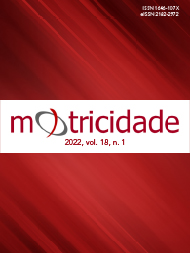The Prevalence and Association of Motor Competence with Weight Status and Bullying: A Cross-Cultural Study
DOI:
https://doi.org/10.6063/motricidade.19752Keywords:
motor skills, body composition, peer relationships, schoolAbstract
The purpose of this study was to compare the prevalence of motor competence among children and adolescents from two metropolitan cities, one in Portugal and one in Brazil, and analyzed the association between motor competence and weight status and bullying roles. A Cross-sectional and cross-cultural study was applied. The sample comprised 785 children and adolescents aged 7-14. Motor competence was assessed using The Körperkoordinationtest Für Kinder (KTK) test, while participation in bullying was assessed using a sociometric test and the students’ Body Mass Index (BMI), which was calculated from height and weight and reported as kg/m2. Portuguese students had a higher prevalence of impairment/disturbance in motor coordination. Also, obese students and bullying victims had higher odds of having a motor competence below normal values in both countries. These findings provide evidence of a link between motor competence and sex and weight status of schoolchildren and suggest that motor competence is associated with bullying roles.
Keywords: motor skills; body composition; peer relationships; school
Downloads
Published
Issue
Section
License
The authors of submitted manuscripts must transfer the full copyright to Journal Motricidade / Sílabas Didáticas Editions. Granting copyright permission allows the publication and dissemination of the article in printed or electronic formats, and copyrights start at the moment the manuscript is accepted for publication. It also allows Journal Motricidade to use and commercialise the article in terms of licensing, lending or selling its content to indexation/abstracts databases and other entities.
According to the terms of the Creative Commons licence, authors may reproduce a reasonable number of copies for personal or professional purposes, but without any economic gain. SHERPA/RoMEO allows authors to post a final digital copy (post-printing version) of the article on their websites or on their institutions' scientific repository.


